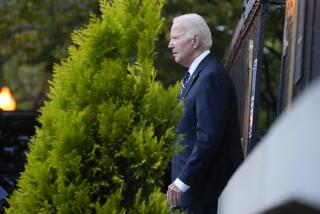Mrs. Clinton’s Stiff Opposition to Prosecutor Told
- Share via
WASHINGTON — First Lady Hillary Rodham Clinton’s opposition to having an independent counsel appointed to investigate the Whitewater controversy was so strong that even the president failed to change her mind before calling for just such an appointment, a former top White House aide testified Thursday.
Mrs. Clinton’s antagonism was based on her belief that there had been “no credible allegation of wrongdoing,” a factor that normally triggers creation of such a counsel or special prosecutor, former presidential aide Mark D. Gearan told the Senate Whitewater Committee.
Reviewing expletive-laced notes he made during daily White House strategy meetings in early January 1994, Gearan wrote that then-White House Counsel Bernard Nussbaum shared Mrs. Clinton’s concern, saying at one of the meetings that an outside prosecutor is “subject to no control.”
According to Gearan’s notes, Nussbaum also said: “You’ll have a 3- to 4-year investigation. Lives will be under a microscope.”
Although Mrs. Clinton’s opposition was publicly known at the time, Gearan’s notes and testimony marked the first disclosure that the president and some White House staff members had tried but failed to change her mind. Clinton, despite his wife’s views, called for appointment of an independent counsel several days later on Jan. 12, 1994.
Eight days beyond that--on Jan. 20--Atty. Gen. Janet Reno named New York lawyer Robert B. Fiske Jr. as the first Whitewater independent counsel. A federal appeals court replaced him as counsel later that year with former U.S. Appellate Judge Kenneth W. Starr, who is now conducting the inquiry.
Gearan’s notes, which included some salty language, were released in full for the first time by agreement of the committee and White House lawyers.
Republicans on the committee sought to show that the White House had tried to exert control over the Whitewater inquiry at this early point but Gearan held his ground, insisting that their discussions were mainly “generic” on the drawbacks of an independent counsel.
More to Read
Get the L.A. Times Politics newsletter
Deeply reported insights into legislation, politics and policy from Sacramento, Washington and beyond. In your inbox twice per week.
You may occasionally receive promotional content from the Los Angeles Times.








